2019 上半年教师资格考试小学英语面试真题及答案
(第一批)
一、考题回顾
二、考题解析
【教案】
Teaching aims:
Knowledge aims:
Students can master the meaning and pronunciation of the new words, “factory worker,
postman, businessman, and police officer”.
Students can learn the sentence structures “What does he do?/ He’s a businessman.”
Ability aim:
Students can ask and talk about career with the new words and the sentence structures
in daily life.
�
Emotional aim:
Students can be interested in learning English and cultivate the awareness of career
and the spirit of cooperation.
Key and difficult point:
Key Point:
Students can master the meaning and usage of the new words and sentence structure.
Difficult Point:
Students can improve the interest of learning English and cultivate the awareness
of career and the spirit of cooperation.
Teaching procedures:
Step 1: Warming-up
1. Greetings. Talk about the weather.
2. Sing a song for students.
Ask them if they can figure out some different careers in this song, and they may
say “doctor, actor, and singer”. Then tell them that today we are going to learn
more new words about career.
Step 2: Presentation
�
1. Present the words and teach
Draw some pictures according to the different words and describe them simply, and
then teacher shows the words to the students and reads them.
2. Present the sentence
Read the conversation for the students. Ask them to listen carefully and find which
sentence is used to ask others’ career and what’s the answer. Write them down on
the blackboard. Then ask student to do an exchange exercise using the words learned
before and the sentence patterns.
—What does he do?
—He’s a businessman.
Step 3: Practice
Do the guessing game. Ask students to guess the words that the teacher is acting.
Step4: Production
Ask students to do a role play and try to make new dialogues with their desk mates
according to new words. 5 minutes will be given. Then invite 2 pairs to share their
dialogues and give encouragement.
Step5: Summary and Homework
Summary: Teacher summarizes the whole class.
Homework: Ask students to tell their parents what they have learned in school today
and talk about their career with the sentence structures.
�
【答辩题目解析】
1. How did you help students learn and master new words in the vocabulary class?
【参考答案】
In a word, I make use of funny and vivid pictures to teach the new words. First,
I draw some pictures about the new words on the blackboard and use simple sentences
to describe them. Second, I lead students to try to tell me the word for each picture
and then give them the right answer. So students will know the meaning of these words
by this vivid method. Third, I ask students to read these words after me, so they
can know and learn the right pronunciation. What’s more, students can practice and
consolidate the new knowledge by the next few activities. So I believe they will
really learn and master the new words.
【答辩题目解析】
2. What’s the mainly difficulty in primary school teaching in your view?
【参考答案】
�
In my view, I think the main difficulty in primary school teaching is that pupils
are easily distracted by something else, and they only can remember the new knowledge
for a short time. So teachers should pay attention to their features, and take
positive and active measures for that. We can make use of funny games or activities
to help students memorize and consolidate what they have learned timely, and review
the knowledge regularly.
一、考题回顾
二、考题解析
【教案】
Teaching aims:
Knowledge aims:
1. Students can master the meaning of the words such as “reading stories”, “doing
kung fu”,
�
“swimming” and “singing”.
2. Students can grasp the key sentence structures “What are Peter’s hobbies?”
and “He likes
singing”.
Ability aim:
Students can improve their ability of listening and speaking.
Emotional aim:
Students can build up their confidence in speaking English.
Key and difficult point:
Key Point:
Words: reading stories, swimming, doing kung fu, singing;
Sentence structures: What are Peter’s hobbies?, He likes doing ....
Difficult Point:
Students can master the usage of the words and sentences and use them in their daily
life.
Teaching procedures:
Step 1: Warming-up
1. Greetings. Talk about the weather.
2. Sing a song with the students.
�
Ask them two questions “Are you happy now?” and “Do you like singing?”. They
may say yes and then tell them singing is our hobby. Then tell them today we are
going to learn about our old friend Peter’s hobbies.
Step 2: Pre-listening
1. Draw some paintings on the blackboard and present some words such as “reading
stories”, “doing kung fu”, “swimming”, and “singing”. Let them understand
the meaning.
2. Read the words together.
Step 3: While-listening
1. Extensive listening
Ask students to listen to the tape for the first time and answer two questions “How
many people are there in this conversation and who are they?, “Which sentence is
used to ask other’s hobbies and what is its answer?”. Then write down the names
and sentences on the blackboard.
2. Intensive listening
Listen to the tape for the second time and ask students to fill in the chart on the
blackboard. Then invite some of them to finish the chart and check it.
�
Step4: Post-listening
Ask students to do a survey about what their hobbies are. Lead them to work in group
of 4 and one of them acts as the group leader to collect their group members’ hobbies
and make a list for us. 10 minutes will be given. After that, invite one group to
share their report. Give encouragement.
Step5: Summary and Homework
Summary: Ask a student to conclude the content of the lesson and summarize with the
whole class.
Homework: Talk about their hobbies with their parents and ask what their parents’
hobbies are.
【答辩题目解析】
1. Talk about your homework.
【参考答案】
Homework is a continuation of teaching. Through their independent thinking, it aims
to help students use knowledge, analyze problems flexibly and solve the problem,
consolidate the language knowledge and format English ability. In this class, my
homework is to ask students to talk about their hobbies with their parents and ask
what their parents’ hobbies are. This homework, on the one hand, can effectively
help students to consolidate the words and sentence pattern we have learned before.
On the other hand, it can also let their parents know their children’s learning
�
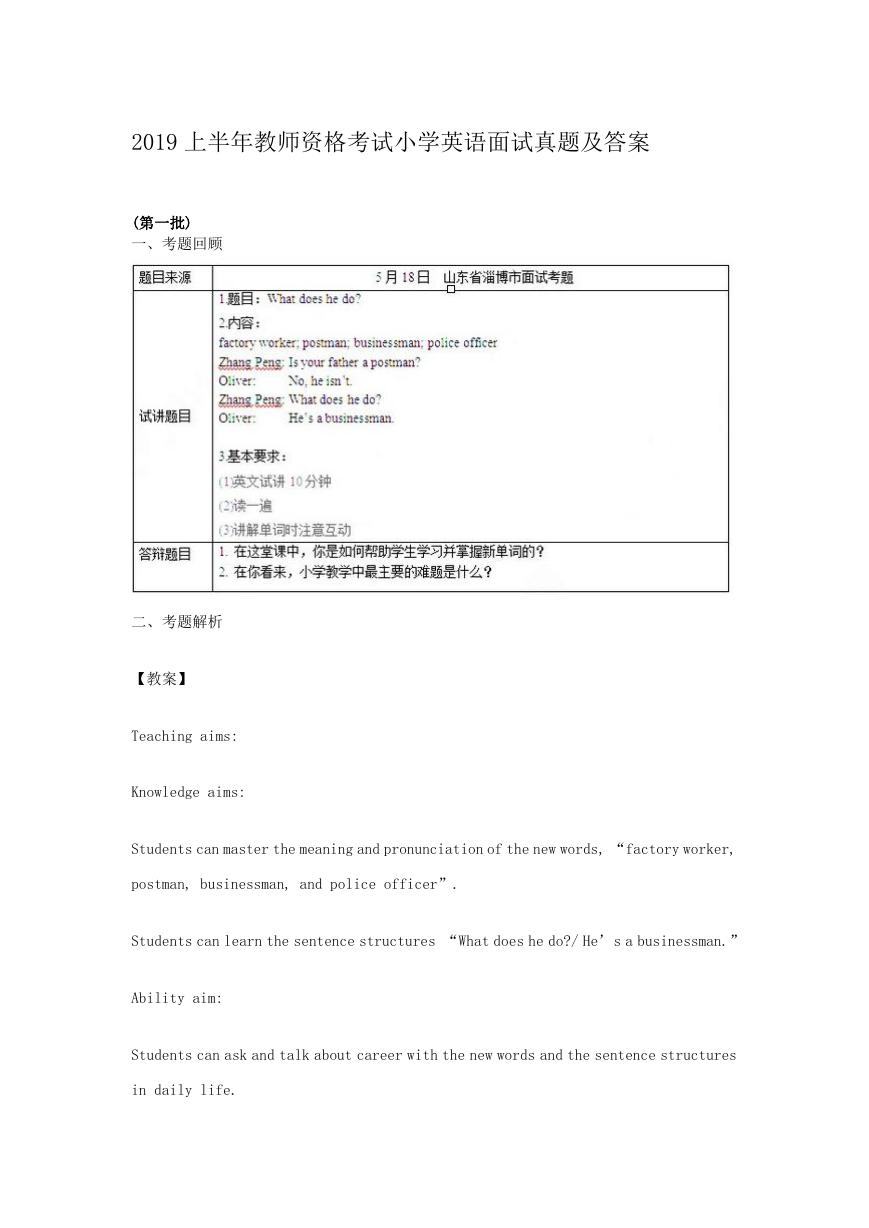

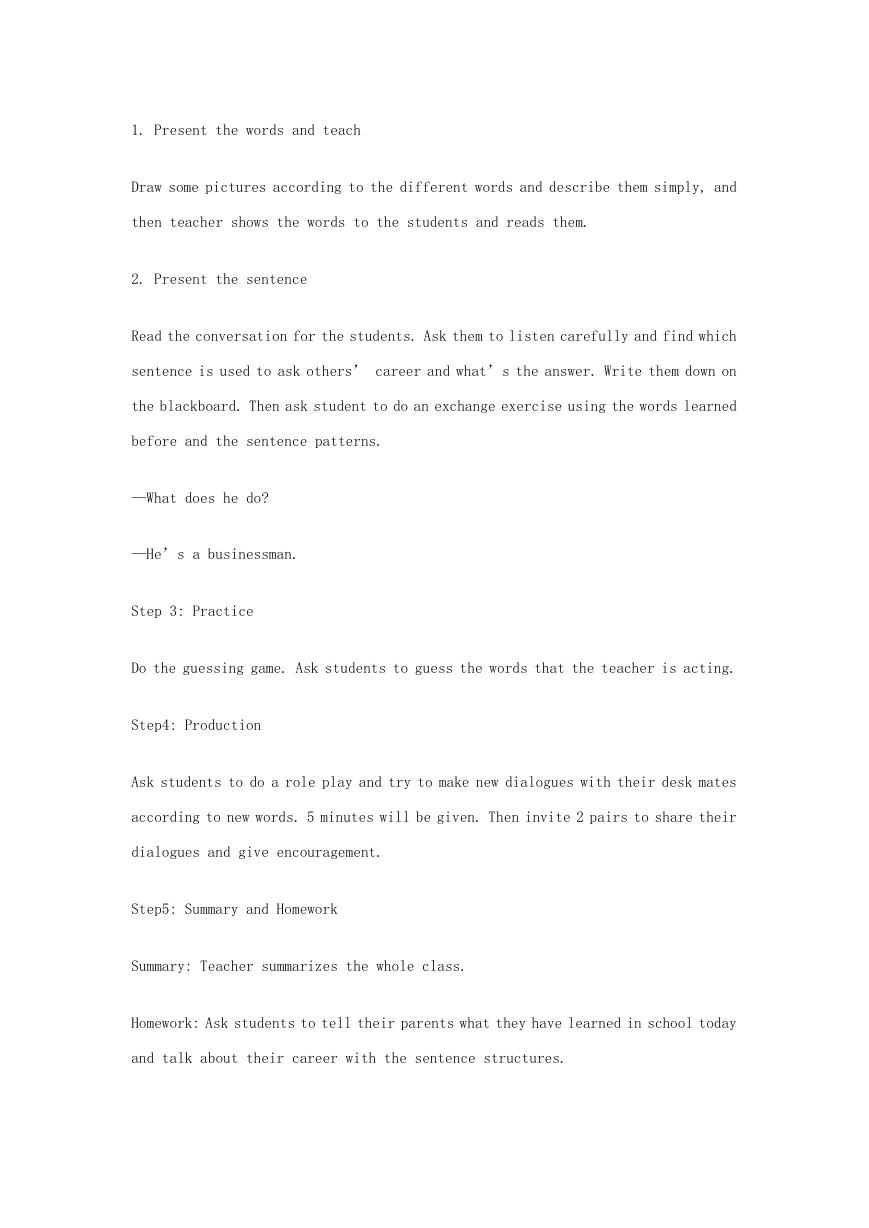
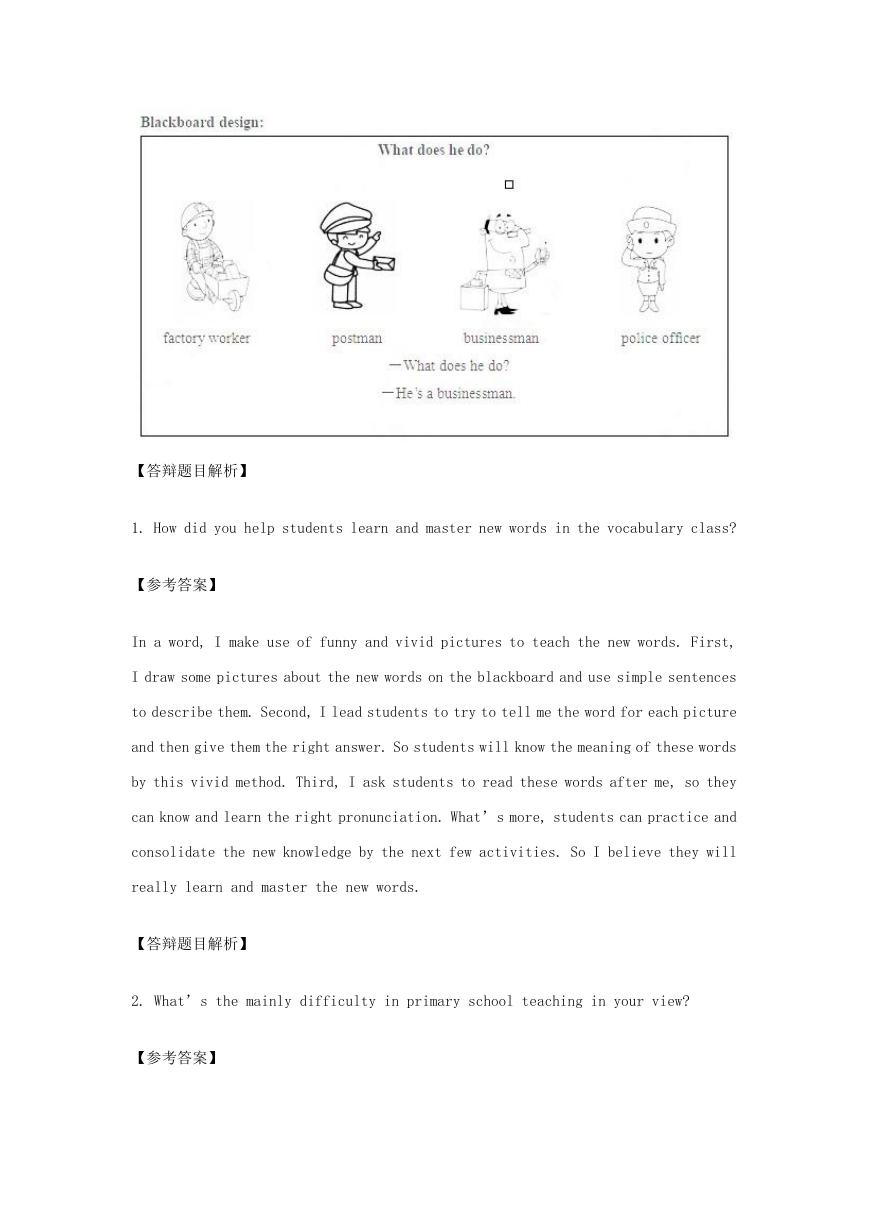
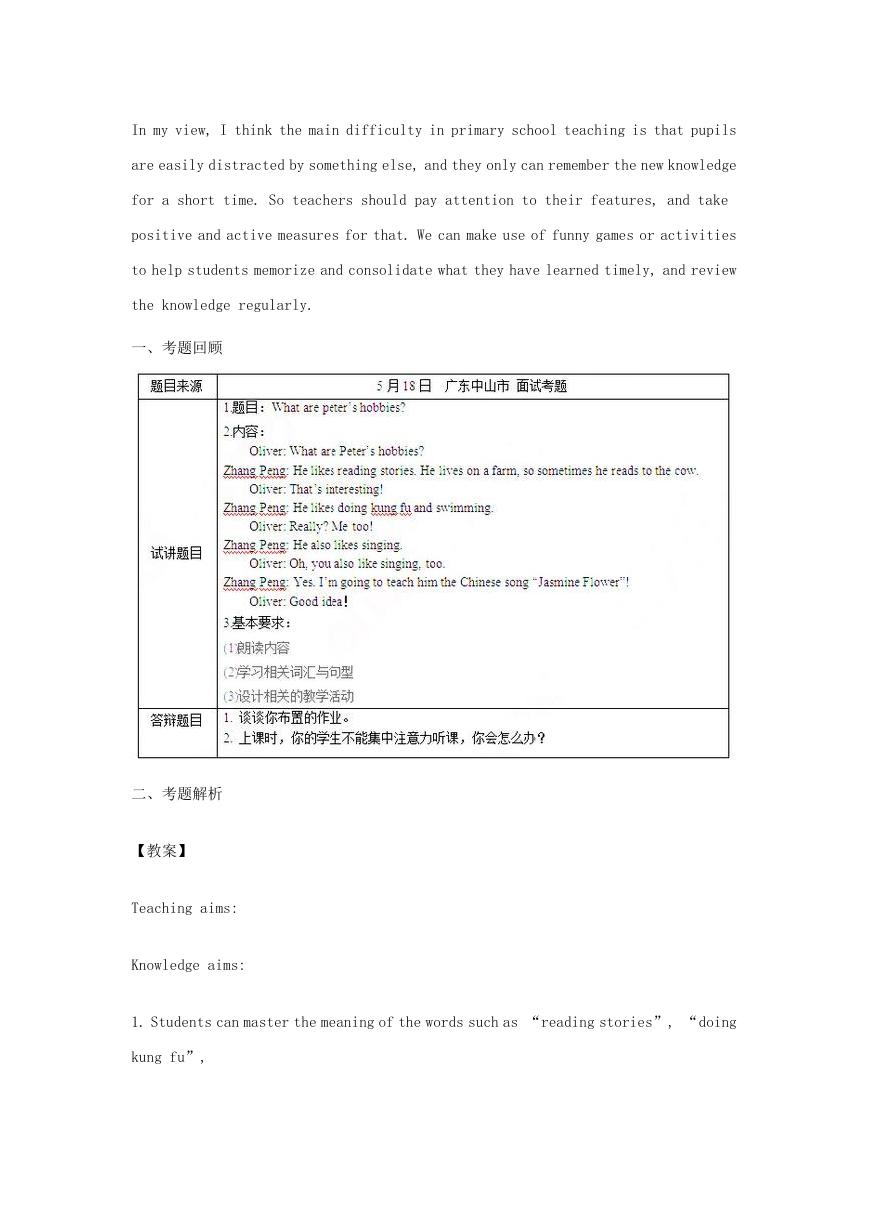
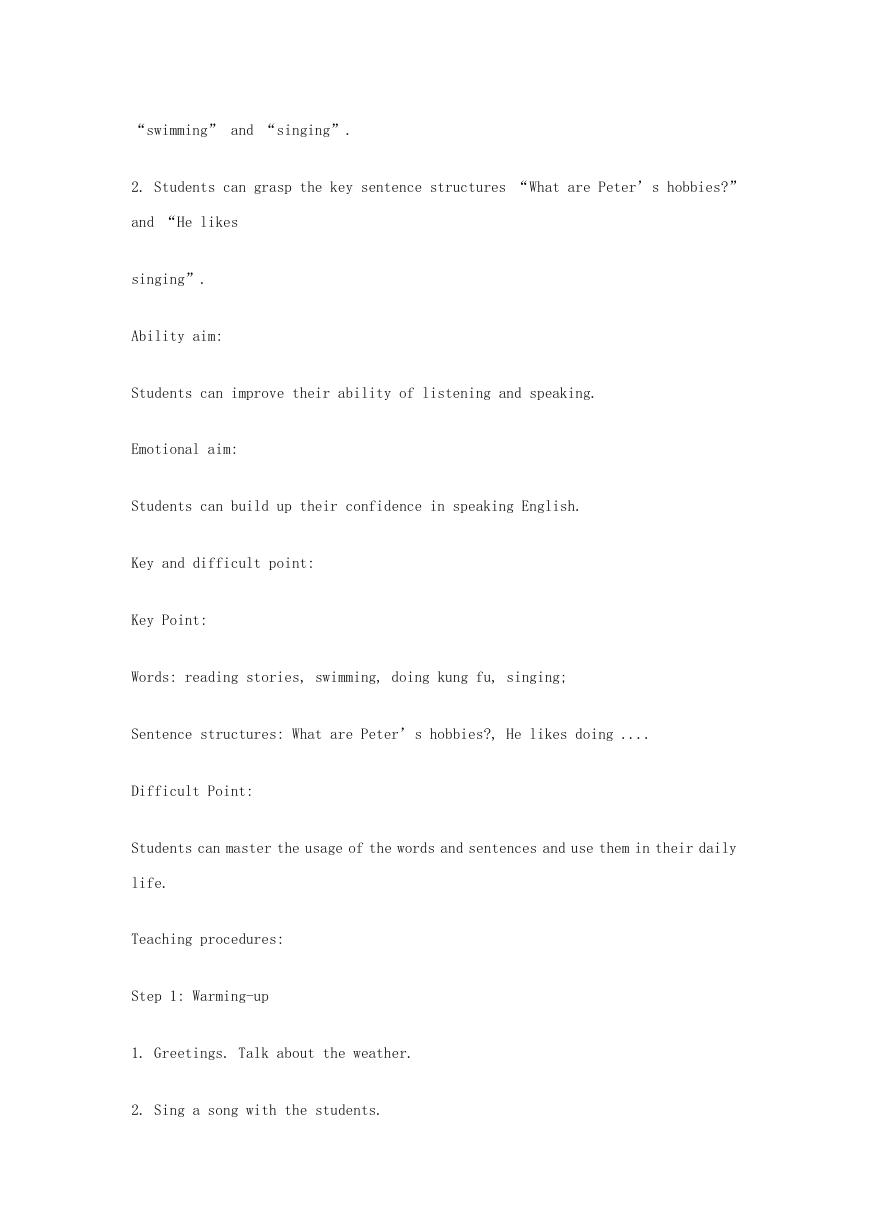
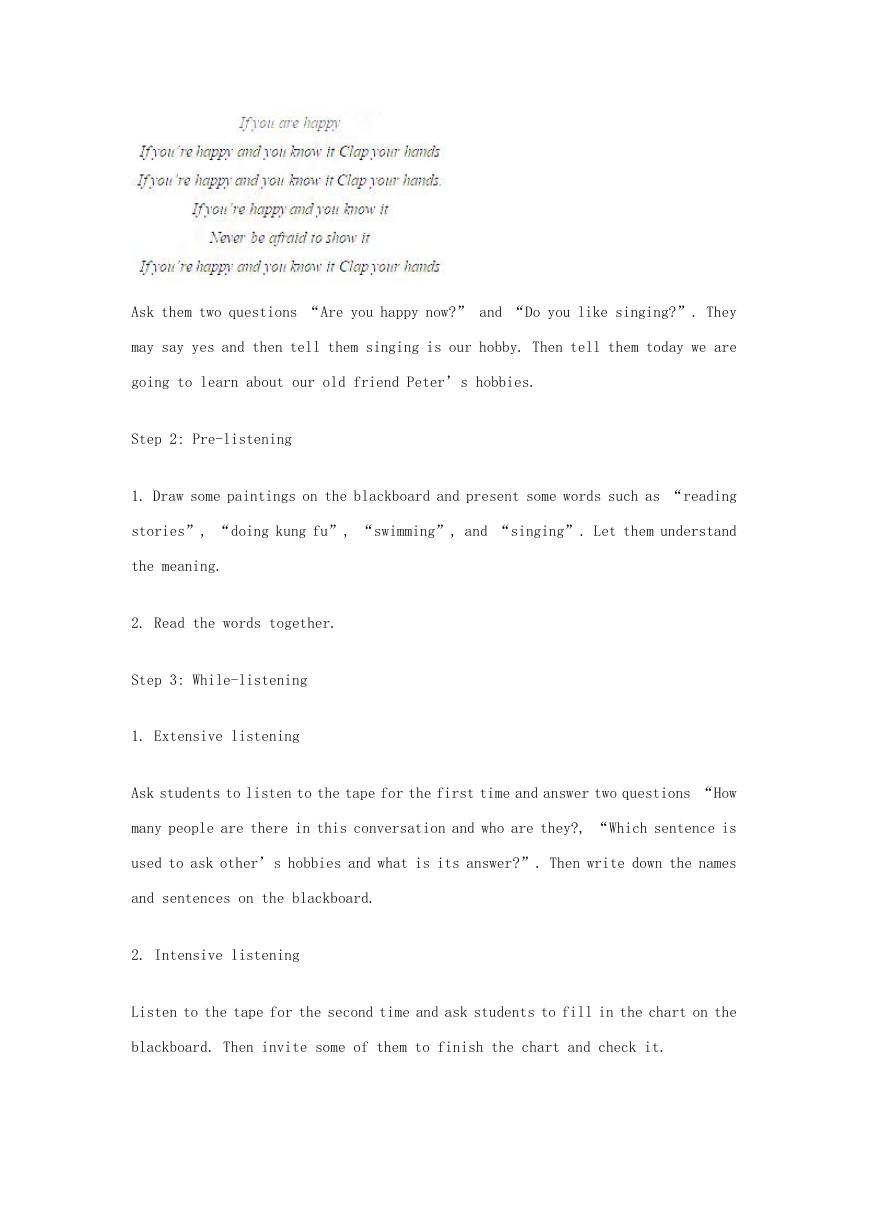
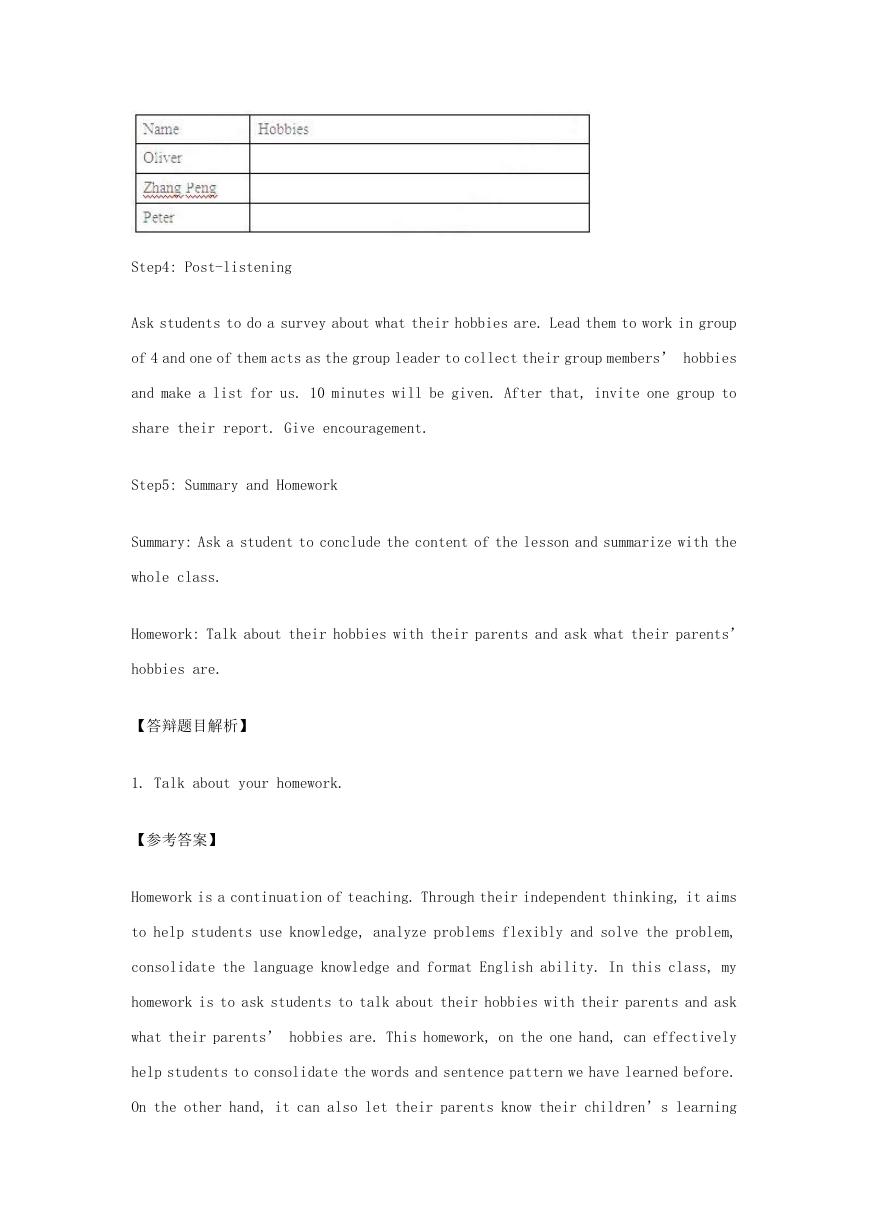








 2023年江西萍乡中考道德与法治真题及答案.doc
2023年江西萍乡中考道德与法治真题及答案.doc 2012年重庆南川中考生物真题及答案.doc
2012年重庆南川中考生物真题及答案.doc 2013年江西师范大学地理学综合及文艺理论基础考研真题.doc
2013年江西师范大学地理学综合及文艺理论基础考研真题.doc 2020年四川甘孜小升初语文真题及答案I卷.doc
2020年四川甘孜小升初语文真题及答案I卷.doc 2020年注册岩土工程师专业基础考试真题及答案.doc
2020年注册岩土工程师专业基础考试真题及答案.doc 2023-2024学年福建省厦门市九年级上学期数学月考试题及答案.doc
2023-2024学年福建省厦门市九年级上学期数学月考试题及答案.doc 2021-2022学年辽宁省沈阳市大东区九年级上学期语文期末试题及答案.doc
2021-2022学年辽宁省沈阳市大东区九年级上学期语文期末试题及答案.doc 2022-2023学年北京东城区初三第一学期物理期末试卷及答案.doc
2022-2023学年北京东城区初三第一学期物理期末试卷及答案.doc 2018上半年江西教师资格初中地理学科知识与教学能力真题及答案.doc
2018上半年江西教师资格初中地理学科知识与教学能力真题及答案.doc 2012年河北国家公务员申论考试真题及答案-省级.doc
2012年河北国家公务员申论考试真题及答案-省级.doc 2020-2021学年江苏省扬州市江都区邵樊片九年级上学期数学第一次质量检测试题及答案.doc
2020-2021学年江苏省扬州市江都区邵樊片九年级上学期数学第一次质量检测试题及答案.doc 2022下半年黑龙江教师资格证中学综合素质真题及答案.doc
2022下半年黑龙江教师资格证中学综合素质真题及答案.doc